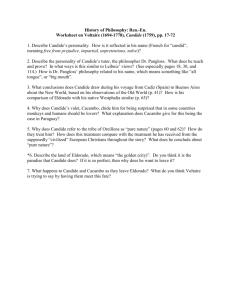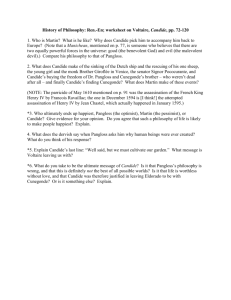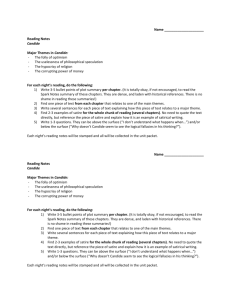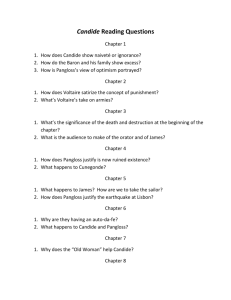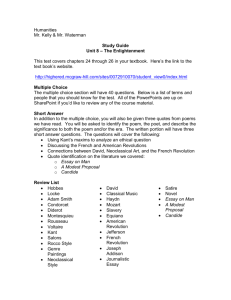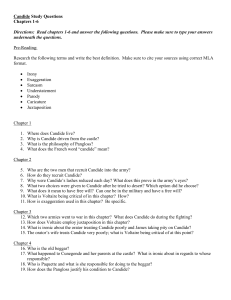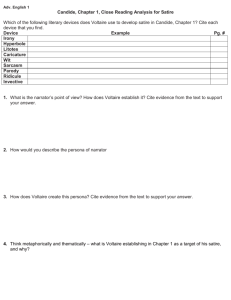Candide Summary
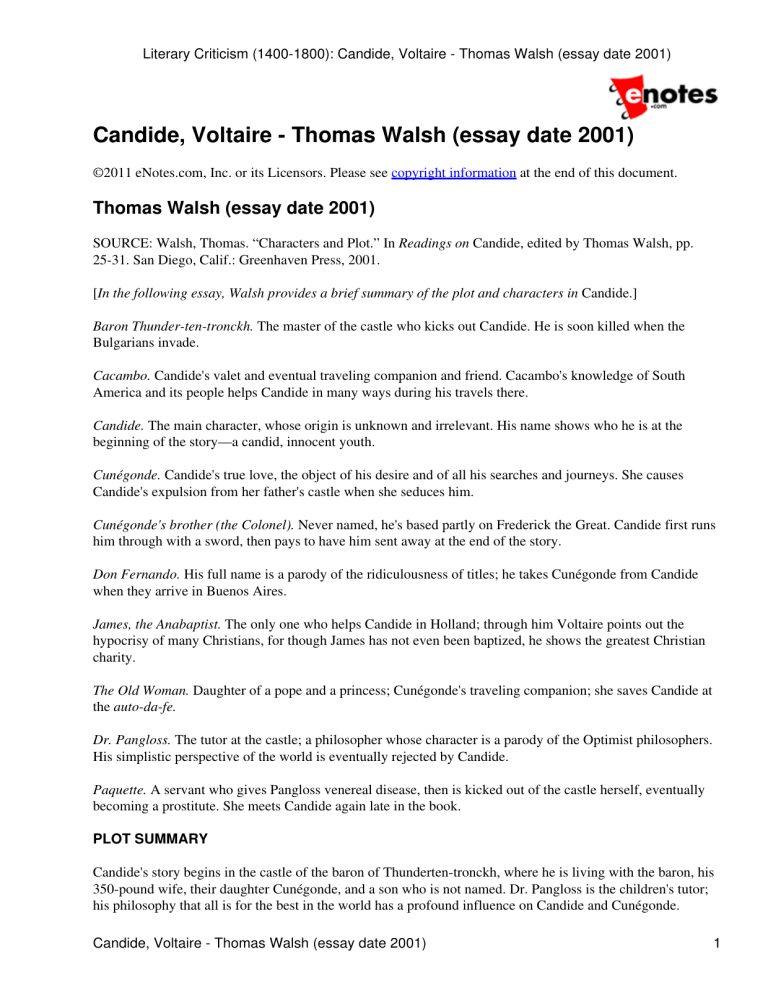
Literary Criticism (1400-1800): Candide, Voltaire - Thomas Walsh (essay date 2001)
Candide, Voltaire - Thomas Walsh (essay date 2001)
©2011 eNotes.com, Inc. or its Licensors. Please see copyright information
at the end of this document.
Thomas Walsh (essay date 2001)
SOURCE: Walsh, Thomas. “Characters and Plot.” In Readings on Candide, edited by Thomas Walsh, pp.
25-31. San Diego, Calif.: Greenhaven Press, 2001.
[In the following essay, Walsh provides a brief summary of the plot and characters in Candide.]
Baron Thunder-ten-tronckh. The master of the castle who kicks out Candide. He is soon killed when the
Bulgarians invade.
Cacambo. Candide's valet and eventual traveling companion and friend. Cacambo's knowledge of South
America and its people helps Candide in many ways during his travels there.
Candide. The main character, whose origin is unknown and irrelevant. His name shows who he is at the beginning of the story—a candid, innocent youth.
Cunégonde. Candide's true love, the object of his desire and of all his searches and journeys. She causes
Candide's expulsion from her father's castle when she seduces him.
Cunégonde's brother (the Colonel). Never named, he's based partly on Frederick the Great. Candide first runs him through with a sword, then pays to have him sent away at the end of the story.
Don Fernando. His full name is a parody of the ridiculousness of titles; he takes Cunégonde from Candide when they arrive in Buenos Aires.
James, the Anabaptist. The only one who helps Candide in Holland; through him Voltaire points out the hypocrisy of many Christians, for though James has not even been baptized, he shows the greatest Christian charity.
The Old Woman. Daughter of a pope and a princess; Cunégonde's traveling companion; she saves Candide at the auto-da-fe.
Dr. Pangloss. The tutor at the castle; a philosopher whose character is a parody of the Optimist philosophers.
His simplistic perspective of the world is eventually rejected by Candide.
Paquette. A servant who gives Pangloss venereal disease, then is kicked out of the castle herself, eventually becoming a prostitute. She meets Candide again late in the book.
PLOT SUMMARY
Candide's story begins in the castle of the baron of Thunderten-tronckh, where he is living with the baron, his
350-pound wife, their daughter Cunégonde, and a son who is not named. Dr. Pangloss is the children's tutor; his philosophy that all is for the best in the world has a profound influence on Candide and Cunégonde.
Candide, Voltaire - Thomas Walsh (essay date 2001) 1
Literary Criticism (1400-1800): Candide, Voltaire - Thomas Walsh (essay date 2001)
Unfortunately, this influence has disastrous results: When Cunégonde sees Pangloss engaged in sexual intercourse with a chambermaid, her curiosity about sexuality is piqued, and she attempts to seduce Candide.
Candide's pleasant existence at the castle ends when the baron catches them in the act and literally kicks
Candide out of the castle.
Candide goes without supper that evening, and is famished and nearly frozen by the time he reaches the next town, Wald-Berghoff-trarbkdikdorff. He is penniless and half-dead, so he gladly accepts an invitation to dinner from a pair of strangers. But the men shackle him and take him away to a regiment of the Bulgarian army, where he is trained in warfare, beaten for every mistake, and brutally mistreated. In fact, when he tries to exert his free will and walk away from the army, he is forced to run a gauntlet of two thousand men thirty-six times. Soon the king of the Bulgarians declares war against the king of the Abares, and Candide witnesses the horrible atrocities of war firsthand. Eventually, he escapes and makes his way to Holland, penniless and starving.
Though Holland espouses Christian principles, Candide is met with animosity and threats of imprisonment for begging. A kind Anabaptist named James offers Candide his help. The very next day, Candide runs into a beggar who is ravaged by disease. He is revealed as Pangloss, who contracted venereal disease from Paquette, the chambermaid. He tells Candide how the castle was stormed by the Bulgarians and everyone there killed.
James helps Pangloss to be cured and even hires him as his bookkeeper. Soon James has to sail to Lisbon on business, and he takes Candide and Pangloss with him.
While in sight of the ship's destination, a strong storm strikes the ship. James falls overboard and perishes.
The ship is wrecked at sea, and Candide, Pangloss, and a sailor are the only survivors. The three make their way to shore just in time to experience an earthquake that destroys three-quarters of Lisbon, killing over thirty-thousand people. Amid the ruins, Pangloss and Candide are arrested by Inquisitionists, who decide to avert future disaster by offering up their prisoners in a sacrificial auto-da-fe (“act of faith,” or execution).
Three other prisoners are burned, Pangloss is hanged, and Candide is whipped. Before Candide can be tormented further, an aftershock hits the city, and he escapes to safety with the help of an old woman.
Eventually the old woman takes him to Cunégonde, who tells him how she escaped the storming of her father's castle. Candide is ecstatic to see her, but he soon learns she is a kept woman. During her wanderings,
Cunégonde was captured and sold to Don Issachar in Lisbon. To ensure that he has no unpleasant entanglements with the Inquisition, Don Issachar has made a deal with the Grand Inquisitor, who had been taken by Cunégonde's beauty, to share the girl. Issachar occupies the house she is kept in and possesses her on
Monday, Wednesday, and Saturday; the Inquisitor takes his place the rest of the week. To save Cunégonde,
Candide ends up killing both men, and he, Cunégonde, and the old woman are forced to flee.
They reach Cadiz, Spain, where Candide is made a captain in the army by virtue of his martial skills. Soon they sail for Buenos Aires, where the army is preparing to put down a rebellion by natives. During the voyage, the old woman, who turns out to be the daughter of a pope and a princess, relates the horrible story of her life.
She describes brutality after brutality, but ends by claiming that she could never kill herself, for she loves life too much.
When they arrive in Buenos Aires, Governor Don Fernando d'Ibarra, y Figueroa, y Mascarenes, y
Lampourdos, y Souza immediately falls for Cunégonde and takes her as his own. Before Candide can act to free Cunégonde, the old woman hears the news that an alcalde, or official, from Spain is landing in Buenos
Aires to arrest the murderer of the Grand Inquisitor. She warns Candide, who immediately flees with his valet,
Cacambo. They go to Paraguay and stay with some Jesuit priests. There Candide meets his reverence, the
Colonel, Cunégonde's brother. They are happy and astonished to see each other until Candide tells the Colonel that he plans to return to Buenos Aires and marry Cunégonde. At this point, the priest is insulted and strikes
Candide. Regrettably, Candide strikes back and stabs the Colonel, and once more he and Cacambo are forced
PLOT SUMMARY 2
Literary Criticism (1400-1800): Candide, Voltaire - Thomas Walsh (essay date 2001) to flee.
Soon the fugitives are captured by fifty Oreillons, the natives of the country, who mistake Candide for a Jesuit priest. The Oreillons see the Jesuits as invaders and take revenge by cooking and eating those they catch. But
Cacambo convinces the Oreillons that Candide is not a Jesuit, and the pair is set free. They wander for well over a month, running out of provisions along the way. Desperate and hungry, they stop at the bank of a river and decide to leave their fates to providence by canoeing down the river in hopes of reaching an inhabited spot. Yet, as with all Candide's adventures, the trip turns into an ordeal that concludes with a twenty-four-hour ride through a dark tunnel. At the end of the journey, however, they arrive in Eldorado.
At Eldorado the travelers find a utopian society that is quite unlike the Europe that Candide left behind.
Money and jewels are so abundant that they are of little value to the inhabitants. The people are civil to each other, and everyone values work, community, and education. There is no religious conflict, and even the king greets people on his own level, embracing his guests and kissing them on the cheek. However, although
Candide admires the values of the community, he soon tires of life without any struggle or conflict, and he longs to be back with Cunégonde. He arranges to leave Eldorado with many sheep laden with gifts of gold and jewels, planning to return to Buenos Aires to buy Cunégonde's freedom from the governor.
Within one hundred days of traveling, Candide and Cacambo lose all the sheep, with their loads of gifts, save two—though the riches that these carry are still enough to make both men wealthy. When they reach Surinam they meet a negro who has lost a hand and a leg; he explains to Candide that as a worker at a sugar plantation, his owners were responsible for both injuries, the former when one of his fingers was caught in a mill, the latter as punishment when he attempted to run away—such was the price that the natives paid so that people in
Europe could have sugar. Thus far, Candide has clung to Pangloss's optimistic philosophy that all is well in the world, but on hearing the slave's tale, Candide rejects Pangloss's rosy and naive outlook on life, explaining to Cacambo that optimism is “the madness of maintaining that everything is right when it is wrong.”
Also while in Surinam they learn that in Buenos Aires, Cunégonde has become the governor's favorite mistress, and that Candide—a known suitor—will surely be killed if he goes after her. Candide decides not to risk his life, so he gives Cacambo a great number of diamonds and arranges for him to go to Buenos Aires to buy Cunégonde from the governor. Candide instructs Cacambo to bring Cunégonde to Venice, when the deal is finished, as Candide plans to sail for Europe immediately. When Cacambo leaves, Candide is robbed of his remaining sheep and left with just a few diamonds. He buys passage on a ship headed for Europe and hires an old scholar named Martin to travel with him, paying his passage and a salary. Martin by philosophy is a
Manichean who maintains that there are two principles—good and evil—which govern the world with equal power. To counter this rather cynical outlook on life, Candide clings to some of his fading optimism and points out the good side of all they experience. Martin, unconvinced, steadfastly focuses on the negative.
Martin and Candide arrive in Bordeaux, France, then take a slight detour by land to Paris, where Candide falls ill. He soon recovers and is taken to a play by an abbé of Perigord, a sleazy character who also takes him to see the marquise de Parolignac, a woman no better than he. The marquise immediately gives Candide a seat at a card table where Candide loses a great deal of his remaining money.
The next day Candide receives a letter, supposedly from Cunégonde, that tells him that she is in Paris and has been very ill. Candide and Martin hurry to see her, but he is deceived by someone who pretends to be
Cunégonde in a darkened room. The deception has been set up by the abbé, and Candide is arrested after giving the fake Cunégonde a handful of diamonds. Though Candide's funds are seriously depleted Martin advises him to bribe the arresting officer. Candide takes the advice and soon leaves Paris.
Candide and Martin travel through Normandy and upon reaching the French coast, they board a Dutch ship heading for Venice. As the ship stops along the English coast on its way to the Atlantic, Candide and Martin
PLOT SUMMARY 3
Literary Criticism (1400-1800): Candide, Voltaire - Thomas Walsh (essay date 2001) witness the execution of a naval admiral who was accused of not having been close enough to the enemy during a battle. Candide is horrified at the spectacle, and pays the captain of the ship to avoid any future stops and sail straight for Venice.
In Venice, Candide searches for Cacambo and Cunégonde to no avail. In the meantime he runs across
Paquette, arm in arm with a friar, and she tells him the story of what happened to her after she was thrown out of baron of Thunder-tentronckh's castle. She has been mistress to a long succession of men who have used her, and she is now working as a prostitute. The friar who had paid Paquette for her services also complains of a miserable life, having been forced into a monastic life by his parents. Candide is depressed by the stories, but he still wants to believe that some good exists in the world. Martin tries to convince Candide that he will not find happy people in the world. Determined to prove Martin wrong, Candide goes to see Senator
Pococurante, whom people say “has never felt any uneasiness.” Candide soon finds out that Pococurante is a cynic, unable and unwilling to find satisfaction in anything, and highly critical of everything. Candide has failed to counter Martin's conviction.
As Martin and Candide continue their search for Cunégonde, they stop at an inn for dinner. There, as luck would have it, they run into Cacambo. Cacambo informs Candide that Cunégonde is in Constantinople and that he had been robbed of the jewels that Candide had given him. With no finances, Cacambo was made a slave by one of the guests at the inn. This guest and five others join Candide and Martin for dinner. During the meal, the six men reveal that they are former kings who have fallen from power. They relate their sad tales and Candide gives a diamond to the king who he believes is worst off.
Cacambo arranges for passage for Candide and Martin on his master's ship, which is going to Constantinople.
He tells Candide what happened to him and Cunégonde since they parted ways: After he bought back
Cunégonde, their ship had been set upon by pirates, and everyone on board had been robbed and sold into slavery. Cunégonde was now a slave to a family in Turkey and had grown ugly in servitude. When the ship reaches the Bosporus Strait, Candide buys Cacambo's freedom. Candide hires a galley to take the trio the rest of the way. On board the galley Candide finds that both Pangloss and Cunégonde's brother are still alive and serving as slaves, working at the oars of the galley. Candide immediately buys their freedom, and as the group sets out to find Cunégonde, Pangloss and the Colonel tell their tales of woe that lead to their slavery.
When the group finds Cunégonde in Turkey, Candide is dismayed. She has become ugly without knowing it, since no one has told her so. Though he does not truly wish to marry her, Candide is determined to fulfill his promise of marriage because of the impertinence of her brother, who insists that Candide cannot marry her.
After consulting with his friends, Candide pays to have the baron sent away, and he marries Cunégonde. The little group settles down on a small plot of land, all working together according to their talents. Martin says,
“Let us work without disputing; it is the only way to render life tolerable,” and they all do so.
Copyright Notice
©2011 eNotes.com, Inc.
ALL RIGHTS RESERVED.
No part of this work covered by the copyright hereon may be reproduced or used in any form or by any means graphic, electronic, or mechanical, including photocopying, recording, taping, Web distribution or information storage retrieval systems without the written permission of the publisher.
For complete copyright information, please see the online version of this work: http://www.enotes.com/literary-criticism
Copyright Notice 4
